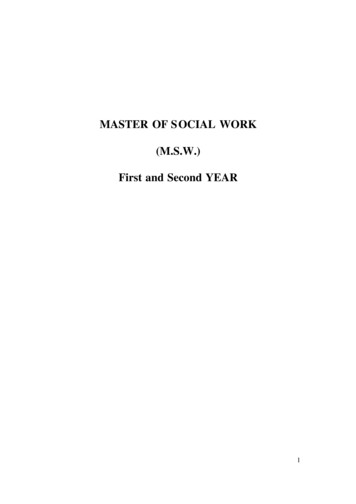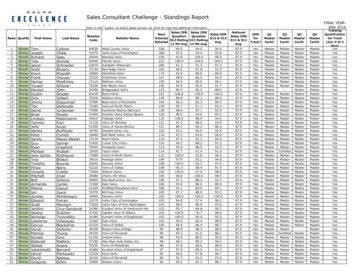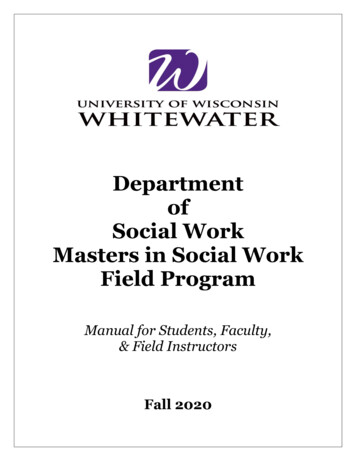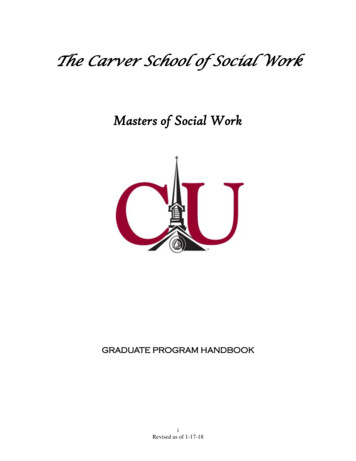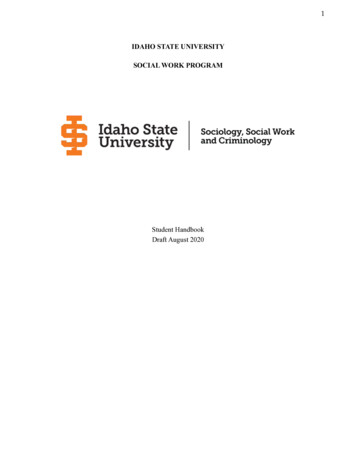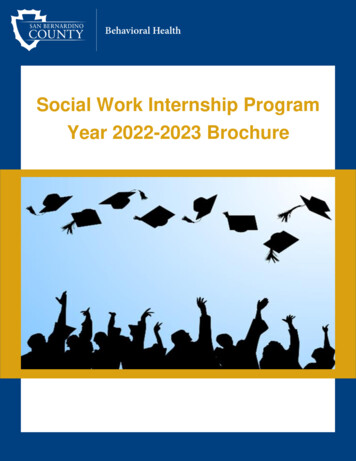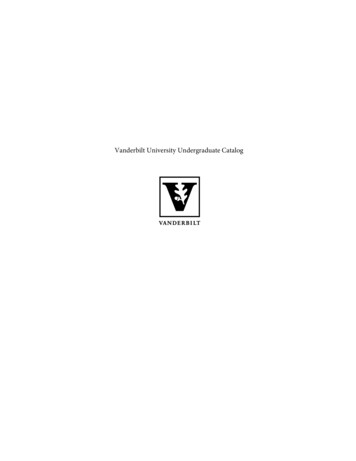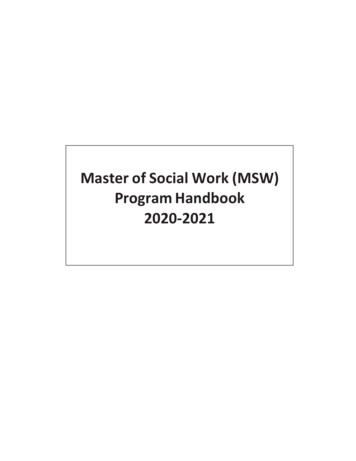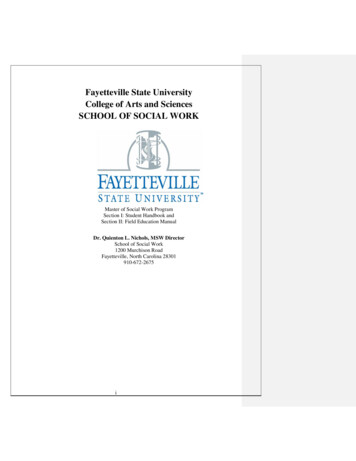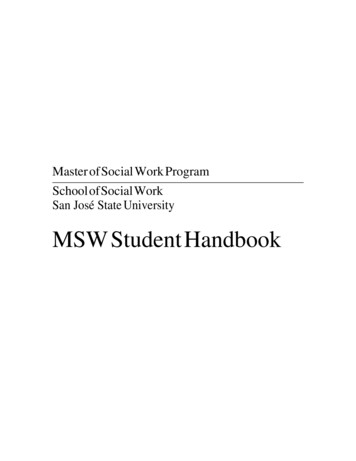
Transcription
Master of Social Work ProgramSchool of Social WorkSan José State UniversityMSW Student Handbook
Master of Social WorkStudent Handbook Last Updated: August 2018Disclaimer : This MSW Student Handbook is for informational purposes only.Although the contents, policies, and procedures within are intended to guide and facilitatethe educational experience of our graduate students, details and particulars may change. The MSW Program at San José State University isaccredited by the Council on Social Work Education MSW Program - San José State University Office Location:Washington Square Hall – Room 215408-924-5800 (office number)408-924-5892 (fax number) Mailing Address:Master of Social Work ProgramSchool of Social Work - San José State UniversityOne Washington SquareSan José, CA 95192-01242
Table of ContentsSectionPageMSW Degree General Overview and Checklist6Introduction8Background of the University and the SchoolSan José State UniversitySchool of Social Work8Master of Social Work Program OverviewMission and GoalsGeneral Organization and Administration of the School of Social WorkSocial Work Graduate Student Association (SWGSA)The Social Work Program Service Area10Master in Social Work Curriculum12Practice from a Transcultural PerspectiveTranscultural Generalist PerspectiveTranscultural Multi-Systems PerspectiveCourse Plans for the MSW DegreeTypical Course Plans for On-Campus 2- Year/Full-Time and 3-Year/Part-Time Students, andOnline/Hybrid StudentsCourse Descriptions22General Status and Curriculum PoliciesChange in Full-Time and 3-Year Status, and Request for Program ExtensionTransfer of CreditsCourse SubstitutionAdherence to University Policy27Academic Policies and ProceduresProfessional and Academic Advising for MSW StudentsConcerns about the MSW ProgramGeneral University and MSW Program Grading PolicyAcademic Dishonesty and SanctionsSocial Work Professional Writing Competency PolicyAdmission to Candidacy for the MSW DegreeApplication for the Award of the MSW DegreeOfficial Changes in Student’s Approved Program of StudyCompleted Requirements for the MSW DegreeFailure to Achieve a 3.0 Grade Point AverageDisqualification and TerminationSexual HarassmentDisability Rights/Policy303
Students Rights to Privacy and Limits of ConfidentialityStudent Evaluation of CoursesNon-Discrimination PolicyProfessional Performance Policies and Additional Academic PoliciesFitness for the Profession CriteriaMaster in Social Work Program Grading and Related PoliciesMSW Degrees and DiplomasConferral of the MSW DegreeLetters of Good Standing45Common Reasons for Delays in Receiving Your MSW DegreeMonitoring Your Academic Progress and Record45Field Education in the MSW CurriculumIntroduction to Field InstructionIntegration with Academic CoursesAdministrative RequirementsOverview of the First and Final Year of Field InstructionSecondary Placements and PreceptorsAdministration of Field Education47Curricular Design for Field InstructionFirst Year Field PlacementFinal Year Field PlacementThe Master’s Special Project: ScWk 29857Field Education ModelStudent-Faculty Field Liaison RelationshipStudent-Field Instructor RelationshipDuration and Hours of Field PlacementDays in Field PlacementAttendance in Field Placements and Professional ResponsibilitiesSafety ConsiderationsExpectations of the Student in the Educational Practicum3-Year Program for the MSW Degree64Evaluation in Field Education70Field Practicum PoliciesAcademic Policies and ProceduresMandated ReportingRequesting Switch in Field of PracticePracticum Grading PolicyNotification of Academic or Professional ConcernWinter IntercessionPlacementUse of Employment as a Field Placement SettingAppeals to the Field Education Program744
Students with DisabilitiesAgency, Field Instructor, and Faculty Field LiaisonSelection of AgenciesSelection of Field InstructorsFaculty Field Liaisons and the FFL System79Special Situations in Field InstructionProblem Resolution and Appeal ProceduresProcedures to be Followed in Addressing Significant Problems in FieldInstructionEarly Termination of PlacementProblems Identified by Student in the PlacementChange in Placement or Re-Placement85The following information can be found on the School of Social WorkWebsite or the Canvas Course “MSW Student Information ResourceCenter (SIRC)”:University and School Forms and InformationField Education ResourcesField Education AssignmentsField Education Evaluations5
MSW Degree General Overview and Checklist Become Familiar with the University and the MSW ProgramThis student handbook, the San José State University Catalog, and the SJSU and School ofSocial Work web sites are good resources to help familiarize yourself with the University andour MSW Program, as well as common policies and procedures. Also, most updates andmajor announcements will be sent via email or posted on our School of Social Work web site.Please note these web addresses:San José State Universitywww.sjsu.eduSJSU Uhttps://my.sjsu.eduGraduate Admissions and Program Evaluations Office (GAPE)http://www.sjsu.edu/gape/School of Social Workwww.sjsu.edu/socialwork/ All students are subscribed to the MSW Google Group and the CanvasCourse “MSW Student Information Resources Cite.” Students shouldmaintain current email addresses. There is also an archive of messages there if youmiss any official School notifications. Please remember to remove SPAM or junk filters onyour email account so that notifications can get through to you. Monitor and Confirm Enrollment, Transcript, Academic Record, and FeesOne of your most important responsibilities while in the MSW Program is to regularly monitoryour enrollment records, posted grades on your transcript, status of your academic record, andfees due to the university. Please be proactive in this, as unfortunately in any bureaucracycommunication and obtaining information in a timely fashion can sometimes be challenging.You can check your status through MySJSU (http://my.sjsu.edu). A common reason for delaysin the University awarding your diploma is misreported or missing information on youracademic record, i.e., “incomplete” grades or no record of your enrollment in various classes. Ifyou discover inaccuracies in your records or have questions about your progress in the MSWProgram, please consult with your MSW advisor and notify the appropriate MSW GraduateProgram Coordinators (on-campus or online) immediately.6
File Form: Departmental Request for Candidacy and Graduate DegreeProgramAll MSW students in their final year of study must file the Departmental Request for Candidacy andGraduate Degree Program form with the MSW Graduate Advisor. Check MySJSU to see thatis processed. The form is available on-line:http://www.sjsu.edu/gape/forms/ File Form: Application for Award of Master’s DegreeAfter the University notifies students that they have been advanced to candidacy for the MSWdegree, MSW students in their final year of study must next file the Application for Award ofGraduate Degree form with the Graduate Admissions and Program Evaluations Office (GAPE)prior to the second Monday in February. Check MySJSU to see that is processed. The form isavailable on-line:http://www.sjsu.edu/gape/forms/ Complete the ScWk 298 Special Study ProjectBy successfully completing ScWk 298, the special study research project, students will havefulfilled the culminating experience and capstone for the MSW degree at SJSU. This project isdone in the final year of study over two semesters. Successfully Complete 60 Units in the MSW ProgramA total of 60 units in the specified MSW Program course plan must be completed at a “B”average or better (3.0 GPA) to earn your degree, with no marks of “C-” or less in gradedcourses, and no marks of “NC” in field education courses. Please consult this handbook fordetails about the appropriate program course plans (i.e. 2-Year/Full-Time, 3-Year/PartTime, and Online/Hybrid). Pass the Graduate Writing Assessment RequirementAccording to SJSU policy, all graduate students are required to demonstrate competency inwritten English as a requirement for graduation. SJSU policy requires that English competencyis a requirement for advancement to graduate candidacy. In the MSW Program, theProfessional Writing Competency policy is that all students must successfully pass a writtenassessment assignment administered in ScWk 212 (i.e. Final Paper). If a student is deficient inwriting ability, the student will be referred to the Graduate Advisor to develop a remedialplan. The student will be reassessed in ScWk 214. File Form: Request for Course Substitution in Master’s Degree ProgramIf you deviate from your stated MSW Course plan originally listed on your Departmental Requestfor Candidacy and Graduate Degree Program form approved by the Graduate Admissions andProgram Evaluations Office (GAPE), you must submit a Request for Course Substitution inMaster’s Degree Program form with the MSW Graduate Advisor immediately. If you do notproperly notify the University, your attainment of the MSW degree will be delayed. Graduate!Congratulations! When you successfully complete all the requirements, you will earn yourMSW degree. The University and Social Work graduation ceremonies are usually held in themonth of May.7
IntroductionWelcome to the Master of Social Work Program at San José State University! The purposeof this handbook is to provide you with basic information about our MSW Program and to answermany of the questions you may have during your educational experience with us. Please review thishandbook carefully and keep it for reference throughout your time here as a student.Background of the University and the SchoolSan José State UniversityFounded in 1857, San José State University is the oldest public university in California. TheUniversity has grown from a small teachers college to a large metropolitan university located in anethnically diverse and dynamic community. In collaboration with nearby industries andcommunities, SJSU faculty and staff are dedicated to achieving the university's mission as aresponsive institution of the State of California: to enrich the lives of its students, to transmitknowledge to its students along with the necessary skills for applying it in the service of our society,and to expand the base of knowledge through research and scholarship.The University’s seven colleges -- Applied Sciences and Arts, Business, Education,Engineering, Humanities and the Arts, Science, Social Science -- enroll approximately 30,000students in programs designed to meet the needs of an increasingly diverse and complex society.Approximately 75% of the student body at San José State University is students of color.The University is located in downtown in San José, 48 miles south of San Francisco, in theheart of Santa Clara Valley and just north of the Santa Cruz-Monterey-Carmel-Big Sur area. SanJosé is a major metropolitan city with a culturally diverse population that includes Latinos, AfricanAmericans, Asian Americans, Native Americans, and other ethnic groups.SJSU is accredited by the Accrediting Commission for Senior Colleges and Universities ofthe Western Association of Schools and Colleges. Various college programs are accredited byspecialized accrediting agencies.For more information about San José State University, please visit www.sjsu.edu.School of Social WorkThe School of Social Work consists of the Bachelor of Arts in Social Work (BASW) andMaster of Social Work (MSW) programs. The graduate program in social work at San José StateUniversity was approved in 1969 and the first class was admitted in 1971. Although undergraduatesocial work education existed since 1939 when the first faculty member was hired in the Departmentof Sociology, the BASW program was also established in 1969. Administratively, the social workprogram was elevated to School status in 1972. The Bachelor of Arts in Social Work program,formerly part of the Sociology Department, was transferred to the School of Social Work in 1974.Between 1991 and 2005, a College of Social Work was formed with administrative responsibility forthe BASW and MSW programs as well as other three other Departments. In 2005, the BASW andMSW programs were once again structured into a School of Social Work and joined the College of8
Applied Arts and Sciences (CASA)* to benefit from collaboration with similar professional programssuch as justice studies, gerontology, health sciences, occupational therapy, and nursing. The latestaddition to the MSW Program is our on-line/hybrid option that was established in 2016.[*Please note that the name of the College has changed to College of Health and Human Sciences (CHaHS)starting Fall 2018.]The BASW and MSW programs were originally created to educate and train social workersfor work with and on behalf of Spanish speaking populations. In 1989 the mission was expanded toinclude a focus on other minorities and women. In 1997 this expansion was formalized with theadoption of a transcultural perspective. In 2005, our commitment to this perspective was affirmedand extended. The School of Social Work maintains a commitment to responding to the changingneeds of diverse communities through quality education, research, and service.The Code of Ethics of the National Association of Social Workers (NASW) guides theprofessional practice of social work for students, faculty, and Field Instructors. The Council onSocial Work Education (CSWE) has continuously accredited the MSW Program since 1973 and theBASW program since 1976.9
Master of Social Work Program OverviewMission and GoalsThe School of Social Work at San José State University is committed to using and promoting atranscultural perspective. This transcultural perspective informs the curriculum and promotesadvocating for social justice, honoring the strengths of diverse cultures, and enhancing the wellbeing of individuals and communities.The vision adopted by the SJSU school of social work is as follows: to provide leadership thatadvances social justice through a transcultural perspective for the health and well being of those who aremarginalized in an increasingly diverse society. Our mission emphasizes preparation for practice that isappropriate to diverse populations in our region of the country and in the State of California. In thisspirit, our mission explicitly identifies our transcultural perspective as a key framework for effectivepractice with diverse populations at risk.The goals of the combined BASW and MSW program derive directly from the School’smission and are as follows:BASW and MSW Program Learning Objectives (PLOs) 2015 CSWE core competencies1 Competency 1: Demonstrate Ethical and Professional Behavior Competency 2: Engage Diversity and Difference in Practice Competency 3: Advance Human Rights and Social and Economic Justice Competency 4: Engage in Practice-informed Research and Research-Informed Practice Competency 5: Engage in Policy Practice Competency 6: Engage with Individuals, Families, Groups, Organizations, and Communities Competency 7: Assess Individuals, Families, Groups, Organizations, and Communities Competency 8: Intervene with Individuals, Families, Groups, Organizations, and Communities Competency 9: Evaluate Practice with Individuals, Families, Groups, Organizations, andCommunities1 Note—these goals are aligned with the most recent Core Competencies of the Council on SocialWork Education.10
General Organization and Administration of the School of Social WorkThe Director of the School of Social Work is responsible for the overall administration ofthe School, the curriculum, and the quality of the education provided in the programs. The MSWProgram Coordinators (on-campus and online) and the Graduate Advisor assist the Director withadministrative functions of the graduate program and the BASW Coordinator provides similarleadership for the undergraduate program. The MSW Program faculty members are responsible forteaching the social work curriculum, preparing students to become professional social workers, andparticipating in the governance of the School.Social Work Graduate Student Association (SWGSA)The Social Work Graduate Student Association (SWGSA) is a student organization formedby and for MSW students. SWGSA participates in and sponsors activities such as orientation,graduation, workshops, guest speakers, advisory committees, social action events, and forums.SWGSA membership is open to all MSW students.The Social Work Program Service AreaAlthough our services and agency partnerships extend throughout the greater San FranciscoBay Area and across the California, the main service area of the School of Social Work includesthe counties of Santa Clara, Santa Cruz, Monterey, and San Benito. These counties are ethnically,racially and socioeconomically diverse and need qualified professionals with social work values,knowledge, and skills to address individual, family, and community problems. The social workclasses are offered at the main campus in San José and most field placements are located incounties surrounding the University.11
Master in Social Work CurriculumThe MSW Program at San José State University is dedicated to the achievement of social change, andsocial, economic, and political justice. Guided by social work values, the goal of the MSW Program isto prepare competent graduates for leadership and practice from a transcultural perspective withmultiple systems at an advanced professional level.Our mission emphasizes preparation for practice that is appropriate to diverse populations in ourregion of the country and in the State of California. In this spirit, our mission explicitly identifies ourtranscultural perspective as a key framework for effective practice with diverse populations at risk.Practice from a Transcultural PerspectiveIn the MSW Program, “transcultural perspective” is defined as a dynamic process ofculturally informed interactions between social workers, clients, and systems that collaborativelyintervene towards the goal of maximizing the well-being of clients, clients’ families, andcommunities. Transcultural perspective is conceptualized as an interactional process that involvesreciprocity, respect, continual professional self-assessment, understanding, and sensitivity to diverselinguistic patterns, values, worldviews, resources, communication, and learning styles. Specifically,the transcultural perspective infused throughout the MSW curriculum, embraces five related butdistinct elements: 1) recognizing the importance of culture in social work at all levels of practice; 2)applying principles of cultural competence in practice; 3) understanding dynamics of power,privilege, and oppression; 4) maintaining an awareness of one's own cultural perspectives, values,and beliefs; and 5) demonstrating respect in interactions with clients and client systems. Althoughwe view culture as an inclusive term encompassing more than ethnicity and race to include class,gender, sexual orientation, and disability, the MSW Program targets the needs of specificethnic/racial populations in the South Bay and California including Latino, Asian American andPacific Islander, African American and other diverse and oppressed ethnic/racial populations.Transcultural Generalist PerspectiveIn the foundation year of the MSW Program, students will attain the values, knowledge, andskills for generalist practice defined as a multi-level (micro, mezzo, macro), client-centered, holistic,and goal-directed approach that involves planning, implementing, and evaluating interventions withclient systems of various size (individual, family, group, organization, community) that are relevantto clients’ bio-psycho-social functioning. Generalist practice, based on multiple theoreticalorientations, is grounded in ecological system theories, a problem-solving process, and atranscultural perspective. Working across systems, the generalist practitioner formulatesinterventions based on situational assessments of problems, goals and size of systems. Thegeneralist practitioner applies research findings and critical thinking to assessment, intervention, andevaluation of his/her own practice.Transcultural Multi-Systems PerspectiveThe advanced year of the MSW Program builds upon the foundation year content andprovides students with a concentration in transcultural multi-systems perspective. Rather thanrepresenting a single method of practice, a transcultural multi-systems perspective emphasizes theimportance of understanding the cultural context and the dynamic interaction between clients andthe systems and sub-systems of which they are a part. Social work practice from this perspectiveinvolves assessment of clients from a holistic perspective and selection of appropriate theories,12
interventions, and practice evaluation strategies suited to the client’s unique needs and context,whether the client is an individual, family, or community, or a combination of these. The socialworker that practices from a transcultural multi-systems perspective relies on a variety of practiceskills, which can be applied to a specific field of practice. Students are afforded an opportunity todevelop these skills in relation to one of three fields of practice that are particularly connected to themission of the program and the practice needs of the region: (1) aging, (2) children, youth andfamilies, and (3) health and mental health. Demonstrating increased skill and more autonomouspractice, the transcultural multi-systems practitioner is able to engage in research and evaluation, andis able to perform differential and multi-dimensional assessments in complex situations. Regardlessof the field of practice, the transcultural multi-systems practitioner utilizes an integrated, culturallysensitive approach, based on critical thinking and a careful analysis of relevant problems and issues.Course Plans for the On-Campus MSW Degree (subject to change)The MSW Program requires 60 units of specified coursework at the graduate level,including classes in human behavior in the social environment, policy, practice, research, and fieldeducation. The full-time program takes 2 years to complete this requirement, and the 3-Yearprogram typically 3 years. Typical Course Plans for all Fields of Practice and for both 2- and 3year and online programs are also found on the website.Full-Time Program (60 units in 2 Years)Foundation - Generalist1st Year Fall5 classes including field practicumst5 classes including field practicum1 Year Spring15 Units15 UnitsConcentration – Transcultural Multi-Systems Perspective(with specialization in a field of practice)2nd Year Fall5 classes including field practicum16 Units2nd Year Spring4 classes including field practicum14 --Total60 Units3-Year Program (63 units in 3 Years)Foundation - Generalist1st Year Fall2 classes1st Year Spring2 classes2nd Year Fall3 classes including field practicumnd3 classes including field practicum2 Year Spring6 Units6 Units9 Units9 UnitsConcentration – Transcultural Multi-Systems Perspective(with specialization in a field of practice)3rd Year Fall5 classes including field practicum16 Unitsrd4 classes including field practicum14 Units3 Year ---Total60 Unit20
Course Plan for the Online/Hybrid MSW Program (subject to change)The MSW Program requires 60 units of specified coursework at the graduate level, including classesin human behavior in the social environment, policy, practice, research, and field education. Thisoption takes 2 calendar years to complete this requirement.Online/Hybrid Program (60 units in 2 Years)Foundation – Generalist1st Session (Fall)2nd Session (Spring A)3rd Session (Soring B)4rd Session (Summer I)3 classes3 classes2 classes3 classes10 Units10 Units6 Units9 UnitsConcentration - Transcultural Multi-Systems Perspective (withspecialization in a field of practice)5th Session (Fall)3 classes10 Unitsth6 Session (Spring A)2 classes6 Units7th Session (Spring B)3 classes9 ---Total60 Units21
Course DescriptionsThe following list of course numbers and descriptions, as well as the above outlines oftypical full-time and 3-Year course plans will guide your enrollment into the appropriate classes toattain the MSW degree. Each semester, MSW Program class schedules will be distributed andadditional information can be found through links on the University web site (www.sjsu.edu) andthe social work web site (www.sjsu.edu/socialwork/).ScWk 202 - Social Policy and Services: History and ValuesHistory of social welfare and social work with emphasis on diverse populations, particularlyLatinos, African Americans, and Asian Americans. Social policy and social work values inrelation to practice issues and social services. (3 units.)ScWk 204 - Social Policy AnalysisFrameworks for analyzing social policies using principles of social and economic justice. Therole of policy in helping or deterring people in attaining well-being. Focus on diversepopulations and populations-at-risk. (3 units. Prerequisite: ScWk 202.)ScWk 212 - Human Behavior in the Social Environment ISystems theory and the ecological model presented with transcultural perspectives frominfancy through the end of adult life cycle. Emphasizes behavior of individuals and families,especially Latinos, African Americans, Asian Americans and other diverse and oppressedpopulations. (3 units.)ScWk 214 - Human Behavior in the Social Environment IISystems theory and the ecological model presented with transcultural perspectives.Emphasizes behavior in groups, communities, and organizations with a focus on Latinos,African Americans, Asian Americans and other diverse and oppressed populations. (3 units.Prerequisite: ScWk 212.)ScWk 220 - Transcultural Generalist Practice ITranscultural generalist practice with client systems, particularly individuals and families, atmicro, mezzo and macro levels. Assessment, planning and implementing interventionswithin a professional relationship, utilizing a strengths perspective, focusing on Latinos,African Americans, Asian Americans and other diverse populations. (3 units. Must be takenconcurrently with ScWk 230.)ScWk 221 - Transcultural Generalist Practice IITranscultural generalist practice with client systems, particularly groups, organizations andcommunities to enhance well-being. Approaches and skills to ameliorate conditionsaffecting people adversely, particularly those of diverse backgrounds and fields of practice.Emphasis on promoting social and economic justice. (3 units. Prerequisites: ScWk 220 andScWk 230. Must be taken concurrently with ScWk 231.)22
ScWk 222 - Transcultural Multi-Systems Practice I: Family Systems FocusTranscultural multi-systems practice with an emphasis on family systems, diversecultural patterns and varying family forms. Assessment of multi-systems interactions ofcommunities and organizations with a focus on enhancing the health and well-being ofmarginalized populations and populations-at-risk. (3 units. If used as the AdvancedPractice Course within the Children Youth, and Family Field of Practice, it must betaken concurrently with ScWk 232. Can also be an Advanced Practice Elective.Prerequisites: ScWk 220 and ScWk 221. Preference given to students in advanced year.)ScWk 223 - Transcultural Multi-Systems Practice II: Community Systems FocusMethods of community intervention at multiple levels focused on empowerment anddeveloping the strengths of diverse groups, particularly Latino, African American,Asian American and other oppressed and marginalized populations. Includescommunity social work, assessment and interventions. (3 units. Prerequisites: ScWk220 and ScWk 221. Must be taken concurrently with ScWk 233. Preference givento students in advanced year.)ScWk 224 – Transcultural Multi-Systems Practice: A Spanish/English FrameworkAnalysis of cultural relevant services to linguistic minority Spanish-speaking population from atranscultural generalist perspective. Skills to include Spanish language interventionsappropriate for cultural access, appropriate assessment, individual, family, and groupinterventions, and advocacy for clients systems at all levels. (3 units. An Advanced PracticeElective. Prerequisite: Pass preliminary Spanish language competency exam.)ScWk 230 - Social Work Practicum IDevelopment of transcultural practice skills with families, groups, and individuals in theirsocial contexts. Emphasis on developing professional roles and relationships,applying multi-systems assessment and interventions, particularly with Latino,African American, and Asian American clients/client systems. (1-6 units.CR/NC. Co-requisite: ScWk 220.)ScWk 231 - Social Work Practicum IIDevelopment of skills to differentially assess the strengths and capacities of interactingindividuals, families, groups, organizations and communities. Application, termination andevaluation of problem-solving interventions from a transcultural generalist practiceperspective. (1-6 units. CR/NC. Prerequisite: ScWk 230. Co-requisite: ScWk 221.)ScWk 232 - Social Work Practicum IIIDevelopment of multi-systems practice skills with individuals, families, groups,organizations and communities from a transcultural multi-systems perspectiveemphasizing family, community and policy practice. Development of skill to use selfeffectively with diverse clients, colleagues and community members from variousbackgrounds. (1-6 units. CR/NC. Prerequisite: ScWk 231. Co-requisites: AdvancedPractice Course within your Field of Practice.)ScWk 233 - Social Work Practicum IVDevelopment of transcultural multi-systems practice skills in a f
Background of the University and the School San José State University Founded in 1857, San José State University is the oldest public university in California. The University has grown from a small teachers college to a large metropolitan university located in an ethnically diverse and dynamic community. In collaboration with nearby .
